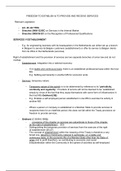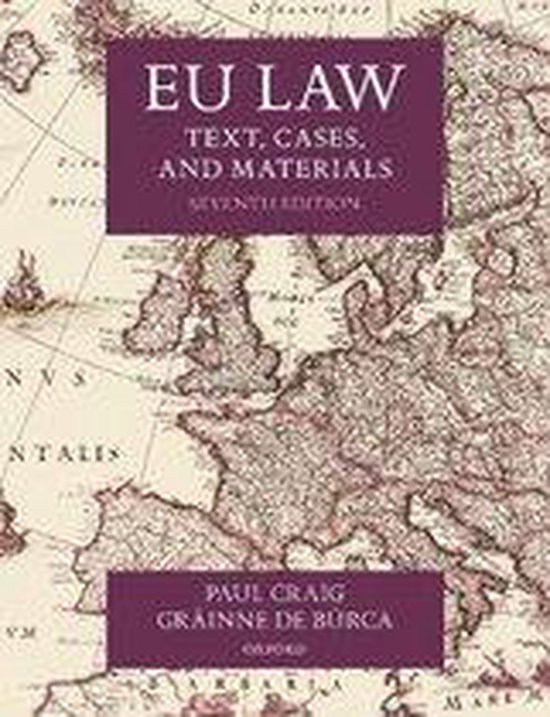FREEDOM TO ESTABLISH & TO PROVIDE AND RECEIVE SERVICES
Relevant Legislation
- Art. 49 -62 TFEU
- Directive 2006/123/EC on Services in the Internal Market
- Directive 2005/36 EC on the Recognition of Professional Qualifications
SERVICES V ESTABLISHMENT
- E.g. An engineering business with its headquarters in the Netherlands can either set up a branch
in Belgium to service its Belgian customers (establishment) or offer its service to Belgian clients
from its office in the Netherlands (services)
Right of establishment and the provision of services are two separate branches of union law and do not
overlap:
- Establishment: integration into a national economy:
- If on stable and continuous basis, there is an established professional base within the host
MS
E.g: Settling permanently in another MS for economic ends.
- Services: temporary nature:
- Temporary nature of the activity is to be determined by reference to its “periodicity,
continuity and regularity”. Providers of service will not be deemed to be “established
simply by virtue of the fact that they equip themselves with some form of infrastructure in
the host MS (Gebhard [39])
- E.g. Enables a self-employed person established in one MS to exercise his activity in
another MS
- Where a person or company is established in a Member State to provide services to
recipients there for an indefinite period, this does not fall within the Treaty provisions on
freedom to provide services.
- Gebhard (C-55/94 [1995]):
- … provisions of the chapter on services are subordinate to those of the chapter
on the right of establishment… [22]
- Distinguishing the temporary provision of services from the exercise of the right
of establishment [25-27]
- The concept of establishment within the meaning of the Treaty is therefore a very
broad one, allowing a Community national to participate, on a stable and
continuous basis, in the economic life of a Member State other than his State of
origin and to profit therefrom, so contributing to economic and social
interpénétration within the Community in the sphere of activities as self-employed
, persons (see, to this effect, Case 2/74 Reyners ν Belgium [1974] ECR 631,
paragraph 21). [25]
- In contrast, where the provider of services moves to another Member State, the
provisions of the chapter on services, in particular the third paragraph of Article
60, envisage that he is to pursue his activity there on a temporary basis. [26]
- As the Advocate General has pointed out, the temporary nature of the activities
in question has to be determined in the light, not only of the duration of the
provision of the service, but also of its regularity, periodicity or continuity. The fact
that the provision of services is temporary does not mean that the provider of
services within the meaning of the Treaty may not equip himself with some form
of infrastructure in the host Member State (including an office, chambers or
consulting rooms) in so far as such infrastructure is necessary for the purposes
of performing the services in question. [27]
Overlap between workers (Art. 45) and Temporary Service Providers (Art. 56)
- Posted workers: Workers employed by a business established in one MS who are temporarily
sent to another MS to provide services do not, in any way, seek access to the labour market in
that second State if they return to their country of origin or residence after completion of their work
E.g. Finalarte
Antanassio (C-384/08 [2010])
- The provisions of the Treaty concerning freedom to supply services apply only if those relating to
the right of establishment do not apply. [39]
Horizontal applicability of Art 56
- Walrave and Koch:
- Treaty rules apply not only “to the action of public authorities but extends likewise
to rules of any other nature aimed at regulating in a collective manner gainful
employment and the provision of services” [17]
- Wouters:
- Applied Walrave ruling to a regulatory measure adopted by the Netherlands Bar
Council concerning partnership between barristers and accountants.
- Laval and Viking:
- Art. 49 and 56 were applicable to the organization of collective action by trade
unions [66].
- Laval (C-341/05 [2007])
- The right to take collective industrial action is a “fundamental” right [89]
- The EC Treaty provisions protecting an employer’s freedom to provide services
in other member states apply to industrial action and can be relied upon by non-
state employers
- Industrial action represents a restriction on the freedom of provision of services
, where it makes the exercise of that right “less attractive” [99]
- It is acceptable if it is to pursue a legitimate aim and is justified by
overriding reasons of public interest as well as “suitable for securing the
attainment of the objective which it pursues and [does] not go beyond
what is necessary in order to attain it” [101].
- The protection of workers is capable of amounting to a legitimate
objective. [102]
- This mirrors the ECJ’s findings in the Viking case in relation to an employer’s
right to freedom of association, but it then went on to rule that:
- Protection of workers from social dumping can amount to an overriding
reason or public interest [103].
- A “blockade” to ensure that workers in the context of transnational service
provision have their terms and conditions fixed at a certain level falls
within the objective of protecting workers [107]
- in the context of posted workers, industrial action in support of a demand
that an employer exceeds the level of protection guaranteed by the
Posted Workers Directive when there are no clearly defined national law
requirements cannot be justified [81]
- Having won the contract to build a school at Vaxholm in Sweden, Laval (a Latvian
company) posted Latvian construction workers to Sweden for that purpose. The Swedish
construction unions tried to get Laval to sign up to collective agreements in the
construction sector covering pay, holidays, other terms and insurance arrangements, but
the company refused. The Swedish construction unions “blockaded” Laval’s sites in
Sweden, with further sympathy action being called by the Swedish electricians’ union.
The Swedish arm of Laval was eventually declared bankrupt. Laval brought proceedings
in the Swedish courts arguing that its freedom to provide services had been infringed and
that it had been discriminated against because of the failure of Swedish national
provisions to take into account collective agreements that it had entered into with unions
in Latvia.
The ‘Official Authority’ Exception:
- Art. 51 TFEU, extended by Art. 62 to cover the chapter on services, states that the
provisions of the chapter on freedom of establishment shall not apply ‘so far as any
given Member State is concerned, to activities which in that State are connected, even
occasionally, with the exercise of official authority’.
- AG Mayras in Reyners defined official authority as implying ‘the power of enjoying the
prerogatives outside the general law, privileges of official power, and powers of coercion
over citizens’.
- Reyners: The Court considered that it was possible to exclude a whole profession on
the basis of Art. 51, but only where the activities in question were so closely linked with
the profession that it would oblige states to allow non-nationals to exercise, even if only
occasionally, functions pertaining to official authority. (Advocates were not held to be so)
- C-492/01 Commission v France: the Court has ruled that Art. 52 does not permit a
Member state to exclude an entire economic sector from the application of the principles
on freedom of establishment and services.
, Non-Discrimination and Equal Treatment
- Equal treatment is required in respect of the terms and conditions on which a service is
provided or received, and equal treatment in respect of social and tax advantages.
- Obstacles to Establishment:
- Work permits, merchant or professional cards;
- More costly measures: deposits and bonds,
- Provisions subjecting non-nationals to double supervision, or requiring them to
establish themselves in order to provide services.
THE RIGHT OF ESTABLISHMENT
ARTICLE 49 TFEU:
- Within the framework of the provision set out below, restrictions on the freedom of establishment
of nationals of a Member State in the territory of another Member State shall be prohibited. Such
prohibition shall also apply to restrictions on the setting up of agencies, branches, or subsidiaries
by nationals of any Member State established in the territory of any Member State.
- Freedom of establishment shall include the right to take up and pursue activities as self-
employed persons and to set up and manage undertakings, in particular companies or
firms within the meaning of the second paragraph of Article 54, under the conditions laid
down for its own nationals by the law of the country where such establishment is
effected, subject to the provisions of the chapter relating to capital.
- The wording suggests that it only applies to discriminatory rules, however Art. 49 was extended to
encompass indirectly discriminatory rules. Based on the understanding that such measures are
more difficult to for non-nationals that nationals to comply with (Klopp; Kraus)
- Factortame:
- The UK’s attempt to impose residence and nationality requirements for those operating
fishing boats was held to be unlawful.
- Art. 49 cannot be relied on by nationals against their own state → but generally can
not in conjunction with Dir. 2005/36
- Where a particular profession is covered by the Directive, a MS may no longer insist on
compliance with its own requirements by people, even its own nationals, who have qualified in
another MS in accordance with the terms of directive.






